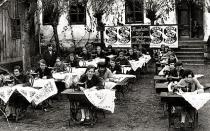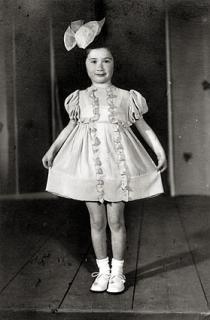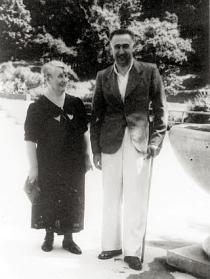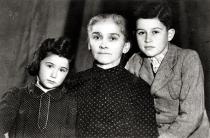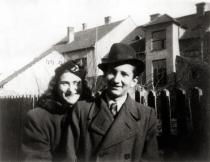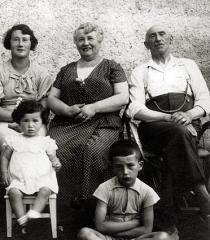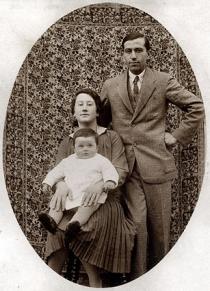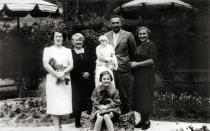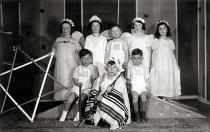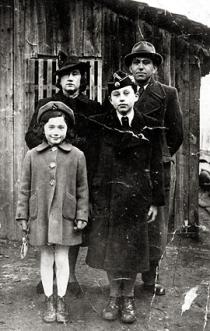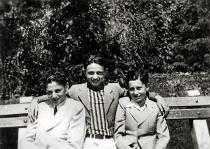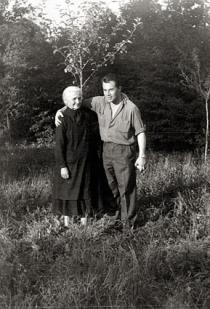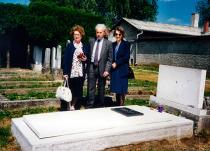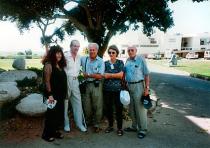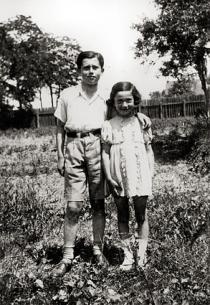
Oto Konstein
Zagreb
Croatia
Name of interviewer: Lea Siljak
Date of interview: February 2003
Oto Konstein is a very active and agile person. He remembers many details from his childhood, especially concerning his friends and family and their life in Cakovec.
He describes his childhood memories rapturously. However, Oto chooses not to speak comprehensively about the events during and after WW II.
Those were very traumatic experiences that Oto chooses to speak about shortly and tersely.
Once a foreign trader, Oto is retired today and lives with his wife in a quiet apartment in the center of Zagreb.
- My family background
My paternal great-grandparents originate from what used to be Czechoslovakia, more precisely from what is Czech Republic today. The paternal grandparents first came from the Czech Republic to Maribor in Slovenia, where my grandfather Salomon Konstein founded a leather factory.
The grandparents came to Slovenia together with their children, three sons – Ernest, Vili and my father Emil, and two daughters – Erna and Paula. They had two more daughters; in total, there were seven children in my father’s family. One aunt, aunt Juli, stayed in Brno, and another aunt, aunt Lisel married and lived in Vienna. At those times, that all used to be the Austro-Hungarian Monarchy.
My paternal grandfather Salomon was born in 1856 and died in 1932, when I was 3 years old. Therefore, I don’t remember him clearly. But I do remember my paternal grandmother Jeanette Konstein very well. She also lived in Cakovec, like my parents, my sister and me, but she lived with her daughter, my aunt, Erna, with aunt Erna’s husband Karol Singer and their son Milan.
My grandmother was a housewife. She was not very religious, like the rest of my family from both my father and my mother’s side. Neither did she look nor did she dress religiously. I am not sure if she attended the synagogue and how regularly, but I know that she didn’t cook kosher food. She cooked traditional Jewish food, for example she made cholent for every Shabbat, but the meat she used was not kosher meat.
I remember she had black hair even in her old age. My grandmother was a wonderful, calm person, good-natured who loved her grandchildren dearly. She had many grandchildren in Cakovec and she spent a lot of time with us. I specifically recall her soft and gentle nature and her love for her grandchildren.
She would tell us stories from Czechoslovakia; unfortunately, I do not recall any of them any longer. But I do remember my grandmother as a wonderful and serene person. Fortunately, she died peacefully at the age of 78 of natural causes, and was not taken to a death camp. She died and was buried in Cakovec. I was already a schoolboy when my grandmother died in 1943.
My father Emil Konstein also came with his parents and siblings to Maribor and worked in his family’s leather factory. My father was a leather-worker. Together with his older brother Ernest Konstein, he completed some kind of a school for leather-workers in Vienna. When my grandparents came to Maribor, they established a leather factory. My father’s brother Ernest was the owner and my father Emil worked together with him.
My maternal great-grandparents originate from Hungary and Medimurje, the northeastern part of Croatia. I don’t know where exactly my maternal grandparents Leopold and Malvina Heimer were born, but they lived in Cakovec most of their lives. Actually, they lived in the same street where my parents, my sister and I lived, so I spent a lot of time with them when I was very young.
My grandfather Leopold Heimer was born in 1874 and he worked in a textile factory, a Jewish factory called Neumann [Neumann is today’s factory called Cateks, a well-known Croatian artificial leather factory]. They used to produce raw textile. I don’t know what exactly he did there, but from my mother’s telling I remember that he was known to be a hard-working man.
My grandmother Malvina, born around 1877, was a housewife. Like my paternal grandparents, my maternal grandparents were not very religious. From what I remember at my grandparent’s home, holidays were observed by going to the synagogue and eating nice meals at home, but Shabbat or kashrut was not observed. They fasted for Yom Kippur and observed high holidays such as Rosh Hashana, they lit candles for Hanukah, but did not do much else.
I don’t recall any particular stories they told me; I was 7 when my grandfather died, and 9 when my grandmother died, so I don’t recall many details. I remember that both grandfather and grandmother looked very old to me. Even though they died young, at the age of around 60, they looked older than they actually were, as if they grew old before their time. I recall that my grandfather was very ill, and he was in Zagreb in hospital.
It must have been in 1935 or 1936 when my mother and I went to visit him in the hospital. That was the first time I came to Zagreb, and although I don’t remember much clearly, I remember that I was very excited. Another thing I remember was that I was ill when either my grandfather or grandmother died, I cannot recall exactly who, but I recall looking through the window at the funeral procession.
It was a Jewish funeral. They are both buried at the Jewish section of Cakovec cemetery. Luckily, neither my grandfather nor my grandmother lived to experience the horrors of the war. My grandfather Leopold died in 1936, and my grandmother Malvina died in 1938.
Matilda Sinko was a housemaid who started working with my maternal grandparents when she was only 13 years old. After my grandmother died, Matilda came to stay with my parents, my sister and me. Matilda was a wonderful, intelligent person; she spoke German, Hungarian and of course Croatian fluently, she had a beautiful handwriting, and made beautiful needlework.
Apart from cooking, cleaning and helping in the household, Matilda played with my sister and me. She didn’t have family of her own, so she considered us her own children; she loved us and we loved her. Matilda was treated as if she was a member of our family, and long after the war was over, I considered her as my grandmother.
It was customary for Jewish families in Cakovec, and I suppose elsewhere, to have housemaids that stayed with a single family and that became a part of that family.
Although she was Catholic and not Jewish, she learned Jewish traditions and customs by living with us. When the war started, she went to her hometown Prelog and lived there until sometime in 1980s when she died. My wife and me went to visit her in Prelog, just a few days before she died, but then we didn’t expect that she would die so soon.
Other things I remember vaguely. My mother had 2 brothers; the eldest brother Bela Heimer was born in 1901. He lived in Varazdin and worked in a silk factory. He was married to Ivka Heimer and they had one daughter named Verica. They were all murdered in the war – his wife and daughter died in 1941 Loborgrad 1 and Bela died in Jasenovac 2 in 1942.
The younger brother Stjepan Heimer was born in 1904. He completed veterinary school in Zagreb and moved to Dalmatia, the southern part of Croatia in 1930s. He first left for Metkovic, and then moved to Sinj where he worked as a veterinarian.
He was married to Greta (nee Cegledi), who was a medical doctor, and they had one son named Stjepan born in 1942. During the war, he and his family were saved. Both Stjepan and Greta were Jewish and both were very liked by the people in Metkovic. The priest in Metkovic county intervened on the behalf of my uncle and aunt, and collected around 15 000 signatures from the whole county so that they wouldn’t be taken away. This is how they survived the war.
My mother was the youngest child in her family. I am not sure where or how my parents met, but I know that my mother Vilma Heimer lived with her family in Medimurje, the northeastern part of Croatia. She was born in Kotoriba in 1911. I have one photograph where she, as a young girl of 16 or 17 attends a sewing course. She completed the course, but she never worked.
She was a housewife, a very diligent young woman, caring very much for her family, very sensitive. Although Matilda was in the house and helped around the household, my mother was nevertheless hard working and diligent in housekeeping. She was a sensitive and a caring mother, often helping my sister and me with homework and schoolwork; she was patient and understanding always showing her love for us.
When she was still a very young woman, she had some health problems and had to be operated. The operation was done in Budapest, I don’t know when, and one of her kidneys was removed. She was a sensitive and fragile person who didn’t have an easy life. She was still very young when she was taken away and murdered.
After my parents married, they moved to Cakovec where both my sister Tea and me were born. Having been educated as a leather-worker in Vienna, and having had some experience in his family’s leather factory, my father opened a leather store in Cakovec and worked there as a leather-worker. My father was a mild, gentle man, and not a strict parent. He was a sociable and open person and had many friends who often came to our house. He mainly socialized with other Jews but he was also in very good relations with the Catholics in Cakovec and the surroundings. I remember him as an approachable person, as a good host always welcoming friends to our house, and mostly as a good family man, a good husband and a very good father to my sister and me.
Cakovec was a very vibrant town, industrially well developed. Most of the factories were owned by the Jews: the firm Neumann, where my grandfather used to work. The Graner brothers owned the Medimurska trikotaza [a famous Croatian textile and knitwear factory]. There was also a chocolate and biscuit factory that was also owned by Jews.
There were many Jewish traders, and in general many wealthy Jews lived in Cakovec and Medimurje. But apart from being wealthy, Jews were also intellectuals and well educated. Among them, there were many doctors, lawyers, graduated engineers and they were highly appreciated by the population of Cakovec. However, not all were well educated or wealthy; there were also middle-class and poor Jews as well, but to a lesser number.
There were generally good relations between Jews and non-Jews. I suppose like in other places, in Cakovec too there were a few people who were anti-Semitic minded, but there were generally no problems. Not only were the Jews equal participants in the society; they also contributed in an advancement of life in Cakovec. There was no ghetto, and Jews lived dispersed around the town.
- Growing up
I was born in Cakovec in 1929. I had a younger sister, named Tea. Tea was five years younger than me. My sister and I got along very well; we were very close. She was a sweet little girl, very lively and happy. My sister and I were very close and we had a wonderful childhood, until they came to take us.
My family lived in a single-story house that had two separate apartments. There was a large hall and to the right of the hall was our apartment, and to the left was the apartment of family Geiger, our neighbors. They had one daughter, Lea Geiger, who is 3 years older than me. Lea survived, and is still alive living now somewhere in Germany. Whenever she comes to Croatia, she calls me and we meet. In my childhood, I remember we played as well as quarreled, just like children do.
In our apartment, we had a large living room, one bedroom for my parents, one smaller children’s room, and a smaller room for Matilda, our maid, when she came to live with us. There was of course a large kitchen, since in those days life mainly took place in the kitchen, especially during the daytime.
The evenings we mostly spent in the living room, or in bedrooms. There was electricity in our house, but no central heating, of course, so we heated on woods. We also cooked on woods. There was one room that served as a bathroom, but that was not a typical bathroom like today.
There was a bathtub in the middle of the room but we had no running water. Instead, the water had to be brought from a well that was in our yard. We didn’t have a television set, but we had a radio and during the war we listened to Radio London in order to hear the news. That was done in secret, so we had to be careful not to be seen or heard while listening.
We had a large yard with a woodshed. In the yard, there were a few fruit-trees, and a small garden, but no animals. We had a mezuzah at the front door of our apartment, for sure, but I don’t remember if we had a mezuzah on every door inside the apartment.
Having spent time with my grandparents, I learned Hungarian since they spoke Hungarian at home. In my parent’s house, we spoke German; Croatian of course I learned with my friends and in school, and later I also learned French in school.
I don’t know the exact number, but there were around 400-500 Jews in Cakovec before the war. That is, around 10% of population in Cakovec was Jewish. We were socializing almost exclusively with other Jews, which was quite normal and logical since there were many of us.
Our families and parents also socialized with Jews and that brought us even closer together. We also attended religious instructions, went to school together, and it was due to this socialization and friendships that we were bonded.
For instance, one of my best friends was Pista Patkai; he was an excellent pianist. His family was Jewish. They were exempted from being taken to the camp. During the war, some people were exempted from being taken away due to their family’s credits.
My friend Pista’s maternal grandfather was a famous Hungarian writer, and his paternal grandfather founded a steam-powered flourmill in Cakovec. Due to their merits, the Patkai family was exempted from the war, and ran away to Budapest where they hid and stayed until the war was over.
Unfortunately, Pista passed away suddenly a few years ago, but for many years after the war we kept in close contact. He founded a quintet and played all over the world, he really was a first-class musician. I don’t have any of his photographs, unfortunately, but I do have his melodies and his music.
In general, there were many young Jewish boys and girls in Cakovec. For this reason, the majority of marriages before the war were Jewish; there were only a few mixed marriages. This is one of the most important and fundamental ways how Jewishness persisted and was maintained. It is not only the same mentality that keeps us together, but also the persecution and similar experiences that keep us tightly-knit. Back then, mixed marriages were exceptions whereas today they are quite common.
One of my friends Fritz Lobl, who was one year older than me, was from a mixed marriage. His mother was from Vojvodina, her surname was Hencej. She stayed in Cakovec and wasn’t taken away during the war. Both her husband and her son, Fritz, died in the concentration camp.
Fritz was together with me in Auschwitz but he endured only 3 or 4 months. Upon my return from the camp, I had to tell his mother that he had died. I had another friend who was from a mixed marriage; his name is Eugen Cajzler. His father was Jewish, and his mother was Catholic.
She could have stayed in Cakovec had she wanted to and they wouldn’t have taken her. But, she didn’t want to leave her husband and her two sons, Eugen and Picko, so she went with them. Eugen was a bit older, so once he arrived to the camp, he was put into forced labor. And he endured it, he survived. However, both his parents and his brother died. Had the mother stayed, she could have survived. After Eugen came back, he was all alone.
The Jewish community in Cakovec was very large in terms of both members and space; I remember well the spacious rooms in the community. All together, there was a complex of buildings: in one building, the rabbi lived with his family, and the president of the Jewish Community lived with his family, one apartment above the other; to the right, there was a Community building with large rooms and a hall where various manifestations took place, such as celebrations of holidays and performances for holidays; and behind these two buildings, there was a large courtyard with the synagogue in the middle of the courtyard.
The synagogue, or the temple as we used to call it, was large and beautiful, and always full for the Jews attended the services on a regular basis. Our rabbi was dr. Ilija Grunwald. Apart from him, there was also a cantor – therefore, two professionals working in one Jewish community. One rabbi, one cantor, one synagogue, and a large Jewish Community building.
The president of the Jewish Community was dr. Schwarz. He was the father of Eva Schwarz, who today lives in Budapest. In addition, there was a kosher butcher who slaughtered animals, but my family did not consume the meat from him. I suppose that the rabbi, the cantor and only a few other families in Cakovec were kosher and consumed kosher meat. There was no mikveh in Cakovec.
Within the Jewish Community, we had many different activities and we met up regularly. Among other things, there was also a Youth Club. As a matter of fact, we had two kinds of Youth Clubs: a Zionist and a revisionist. The Zionists were the followers of Weizmann 3–while the revisionists followed Jabotinsky 4, the latter were more revolutionary. Some of us belonged to one, and some to the other group, but we didn’t make large distinctions and we mostly socialized together.
In Cakovec there were many wealthy Jews and we often went to their houses to entertain. In one of these houses, I remember there was a ping-pong table and musical instruments and a few friends and myself would play all day long. Already as a young boy, I was inclined to music and together with Pista and other friends we played Hungarian melodies and had a good time. There were also two families that were related among themselves; their surname was Langer and Weiss. They had a wholesale store with food grains that was in our neighborhood.
The whole family was very musically talented, and we used to spend every day together playing and listening to music. When I recall now, we used to live very well. Even though we had no television or radio, we would entertain well. We’d go to the cinema in the afternoon, and in the evening to we’d walk down the corzo [a promenade in the center of the town].
My family is Ashkenazi. In Cakovec, there were no Spanish Jews, Sephardim. Neither my grandparents, nor my parents were very religious. At home, we celebrated all the holidays and kept Jewish tradition. Every Friday and Saturday we regularly went to the temple as well as for all the holidays.
We celebrated the holidays according to the tradition respecting the elementary religious laws and customs, especially with regard to dietary customs. For example, for Passover we ate only maces and didn’t consume bread. We celebrated Seder in the Jewish Community building; the rabbi and the cantor were leading the services and ceremonies.
For Yom Kippur, my parents fasted the whole day; my sister and me fasted only until the noon. My father didn’t wear a kippah; he put it on only while in the synagogue and didn’t wear it at home. It is possible that my mother wore a hat or a scarf in the synagogue, but I cannot recall precisely.
Every Friday night we would have Shabbat dinner, but we didn’t sing songs around the table. My father and the whole family went to the synagogue for Friday night and Saturday morning services, and for the holidays of course. Neither my father nor me nor any other members of my family attended the synagogue services during the weekdays.
At home, we lit the candles for Hanukah, and we lit candles and oil-lamps for the deceased. But we didn’t light the candles for Shabbat. I think this was the case for the majority of Jewish families in Cakovec, except for those families that were very religious. But there was only a small number of Orthodox Jewish families in Cakovec. Although the level of socialization was high among the Jews, both older and younger, Cakovec was in general a very liberal town when religious and inter-religious relations were considered.
It was the tradition that for Passover, Purim and Hanukah celebrations were made in the Community. For both Purim and Hanukah, children made a performance. I was involved with a group and we played music; usually those were Jewish traditional songs but we also played Hungarian melodies.
We had rehearsals before public performance and for those performances we were skilled by Duci Stern who was a musician himself. Other children made a theater performance, usually on the theme of a holiday that was celebrated.
For Purim, of course, we put masks on. Most of the girls were masked as Queen Esther, and boys were masked as Mordechai. My family celebrated Hanukah both at home and in the Community. We lit candles at home every evening of Hanukah, and in the Community we had a celebration with the rest of the Community. We sang “Moaz Cur”. I hear the melody of “Moaz Cur” that is being sung in the Zagreb Community today, and I hear that the melody remained the same.
The text, however, is pronounced differently today than we pronounced it once. We learned to read Hebrew text with a different pronunciation and diction than the text is read today. We spoke with Yiddish pronunciation. For example, we would say Gut Shabes or Gut Yontef, the words I don’t hear in our Community today.
Although my father and I were in a very close relationship, we never studied Torah or Talmud together. Neither did he teach me or did we have any discussions about Torah or religious issues. All that I learned about our religion and traditions was during the religious education with our rabbi. I didn’t have Bar Mitzvah because I turned 13 in 1942. It was already very critical and dangerous. Otherwise, Bar Mitzvah celebrations were commonly taking place in Cakovec before the war.
Before the Second World War started, I recall that the children in school would mock the Jews. I remember that they used to call us ‘Zibek’. This word comes from the word ‘Zidov’ [Croatian for Jew], and they would yell at us Zibek. However, I don’t think I could consider these incidents anti-Semitic. I don’t think that there was any serious or acute anti-Semitism present in Cakovec before the war. Or at least I didn’t feel it.
- During the war
From April 1941 to April 1944, Cakovec was under the Hungarian occupation. For the first two years during this period, there were no greater differences from our life until then. We lived more or less normally as we lived until then.
In 1943, there was a border between Cakovec and Varazdin, a nearby town; Cakovec was under the Hungarian occupation and Varazdin was under NDH, the Independent State of Croatia 5. There was numerus clausus in Varazdin, which meant that only a limited number of Jews was entitled to study in schools. Since there was only an elementary school in Cakovec, I had to attend high school in Varazdin for two years. But because numerul clausus was employed, I couldn’t attend high school any longer.
Therefore, in 1943 I started to work illegally. For one year, I was delivering newspapers and I worked in a weaver’s store. In this way, I helped my family in earning some money since my father was forced to close his store in 1941.
At first, this wasn’t so terrible until Hungarian fascists, so called “Njilasi” came to power at the beginning of 1944 6. Until then, people were sent to forced labor, myself included, but in general we didn’t have any greater repercussions. When Hungarian fascists came to power, we were forced to wear a yellow star. Regardless of the fact that I was just a young boy, I also had to wear the star.
So did my sister and my parents. I don’t really remember how my father supported us financially after he was forced to close his store. He had a truck that he sold and that provided some money. We also had some savings. I know that I worked from 1943 to 1944 until they took us away to help support my family.
Around April 1944, most of the Jews in Cakovec were taken to the synagogue where the Hungarians held us captive for about two days. From there we were taken first to Velika Kanjiza (Nagykanjisza) and then to Auschwitz. We didn’t know what was really happening.
Of course, we were aware that terrible things were going on but we also heard that, by 1944 the Allies were coming forth and we assumed Germans were losing the war. I think it was unimaginable for us that all these horrors were happening to Jews. People didn’t know about concentration camps and murdering of Jews;
I assume that, had they known, they would have tried to run away or hide. Nobody really expected anything like this to happen. We thought we’d be captured somewhere for just a few days or weeks until the war is over and that all will be well again.
I was taken to Auschwitz in May 1944. People usually don’t know the difference between Birkenau and Auschwitz and they think that Auschwitz was one large concentration camp. But, they first took us to Birkenau, a huge transit camp that could receive about one hundred thousand victims. In Birkenau we were unloaded and put through a selection; some were taken left, others were taken right.
One thing that is interesting in this story is that my life was saved because of my knowledge of German language. When we were being unloaded, I was still together with my mother and my sister. I was then approached by one of the concentration camp inmates, the one who was unloading our belongings from the train, and he asked me: ‘Do you speak German?’ I said: ‘Yes.’ Then he asked: ‘How old are you?’ And I said: ‘15.’ Then he said: ‘Listen, don’t hold on to your mother or your sister.
When they take you to the medical board, tell them you’re 16, throw your chest out and make sure you show them you are capable to work.’ This is how it was. I was separated from my mother and my sister, although I thought we would be able to visit and to be in contact. For a long time, I didn’t really know what was happening. And what happened was that my mother and my sister were taken to the crematory in Birkenau, and I stayed in Auschwitz and was forced to work.
From Auschwitz I was transported to a nearby camp, a so-called Nebenlager where I worked partly in a coal mine, and partly in bricklaying. As the Russians were approaching, we were evacuated from this prisoner camp to the Dora Buchenwald camp. I stayed there from January to April 1945.
As the Allies came closer to Dora Buchenwald, we were transferred to Bergen-Belsen. I was in Bergen-Belsen when we were liberated. There were several inmates from the former Yugoslavia and we kept together at all times. One of the former Yugoslavians cleverly thought to hide in one of the cellars in Bergen-Belsen among the corpses.
That was the only chance for us to survive, to hide among the dead bodies in the cellar, and to wait for the liberators. We survived because we were among the corpses. And then, as the English came, we were liberated.
- After the war
After the liberation, we were not allowed to go out of the camp for about 2-3 weeks because we were sick and we looked very sick. I must have been 52 kg when I was sent to the camp, and 28 kg when the war ended. It happened that people who ran away from the camp died of dysentery or because they simply couldn’t take in food any more.
The English were very smart to keep us in quarantine and to give us dietary food until we recuperated. There were three of us companions, one from Slovenia and another one from Serbia, and when we recovered we ran away from the camp.
All we wanted was to go home. Bergen-Belsen was close to Hamburg and it took a long, long time to return home. We walked, we hiked, we used all kinds of transportation, we really went in every way possible. The roads were damaged, the bridges were destroyed, and by very many different means we managed to reach Prague. That must have taken us about 2 months.
Once we reached Prague, it was a bit easier since the victims were taken in very kindly there. A whole group of us Jews who survived the concentration camps, both male and female, stayed in a castle in Prague for a while. I remember the name of the caste: Titova kolej. Many of them were from Vojvodina, and we kept in contact for some time afterwards.
Somehow, and through many obstacles, I reached the Austrian-Yugoslavian border. The control was very strict at the border. Being afraid that they might let Ustasha 7 or fascists in, they didn’t want to let in just anyone so the checks were very rigorous. After they saw the number on my arm, the number from Auschwitz, I was given a pass in which it was stated that all civil and military authorities should treat me kindly. I still have this pass.
Since I had no problems with the officials, I started off on foot from the Austrian-Yugoslavian border to Cakovec. I remember, I arrived home at midnight. To a home that was completely robbed. That night I slept in an empty apartment. At the age of 16, I happily returned home only to find no one.
On the following days I tried to find anyone who was still alive, and then I remembered the Patkai family, the family of my friend Pista, who were hiding in Budapest during the war. They had just returned to Cakovec at that time, and they took me to stay with them for some time.
When one of my father’s friends saw me, saw that I was still alive, he started to cry and gave me 10 dinars; that was the only money I had. In the meantime, I sent a telegram to Metkovic, where my mother’s brother Stjepan Heimer lived with his wife. They were the ones who were saved during the war by the priest and the people of Metkovic county. I received no answer from him after I sent the telegram, so I sent him a card.
When he received the card, he immediately came to Cakovec to see me. I don’t know which route he took, but I am sure it wasn’t easy to come from Metkovic to Cakovec.
Ever since then, and until the time of his death in 1987, we were extremely close. Afterwards, he even came to Zagreb to work as a veterinary inspector. He was practically like a father to me. I became very attached to this uncle of mine, who was my mother’s favorite and my mother was his favorite. This made a strong bond between him and me, and I never considered separating from him. Perhaps this is one of the reasons why I never considered moving to Israel after the war.
I completed secondary school in Zagreb. I worked for 12 years as an economist in textile industry. Afterwards, I worked for 10 years in a sock factory in Zagreb. Then, after 10 years of work in the sock factory, I was enrolled to study foreign trade, in a school that was the first foreign trade school in Zagreb.
This school lasted for 2 years, or 4 semesters. And, as I completed foreign trade, and considering my knowledge of foreign languages, I worked as an economist in foreign trade. I worked and lived in Zagreb, and never had to work abroad.
I’ve been living in Zagreb since 1947. I met my wife Katarina (nee Ovcar) in Zagreb. My wife is not Jewish, she is Catholic, a Croat. She was born in Cakovec in 1933, but has been living in Zagreb since 1951. Katarina completed a 5-year long University of chemical engineering and was a Professor in one of the technological colleges in Zagreb. Today she is retired.
We have only one son, his name is Tomislav. Tomislav was born in Zagreb in 1958. He completed electro technology at he University in Zagreb. Today he lives in Basel, Switzerland. He has taken neither one nor the other direction in his religious orientation, he is half-half.
He knows he is Jewish, but in order not to hurt either his mother or me, he keeps neutral. In his soul he is Jewish, but he keeps neither Judaism nor Catholicism. He also has only one child. My granddaughter’s name is Tea, she is 7 years old. She was named after my sister who was murdered in 1944 in Birkenau. She is very proud to be called Tea.
After the war, life in the communist Yugoslavia was without any problems from the point of view of religious or national discrimination. There are many people today who say that, during the former communist regime, one was not allowed to say that he was a Croat. This is not true and whoever says this perjures himself. You could be what you felt.
I as a Jew never had any problems. I have always emphasized that I am Jewish, in comparison to some others who kept it a secret after the war. For me, my first words to someone were always that I am Jewish, not so much out of pride, but because I never wanted to keep it a secret.
If someone minds me being Jewish, he’d better not have anything to do with me. I have also been traveling around the world and have met many Arabs. We always spoke nicely, and I never had any problems. Once I say my name is Konstein, it is clear that it is a Jewish name. After the war, I never felt threatened and never felt any dangers for being Jewish.
I have always been a member of the Jewish community in Zagreb. When I came to Zagreb in 1947, I came straight to Palmoticeva, where the community building is. I come here regularly and I’ve been very active since then. One of my friends doesn’t want to be a member of the Jewish community even though his whole family is Jewish.
I don’t know why; maybe he doesn’t want to be registered as a Jew any more, especially after what happened to him. He was in one of the concentration camps, I think in Mauthausen. But, I do hold this against him, and I openly told him: ‘You were in the camp, your parents are Jewish, your grandparents, the whole family was Jewish, you socialize only with Jews, why wouldn’t you be a member?’ He doesn’t want, and I hold this strongly against him.
In 1991, when the war broke out in Croatia, I felt terrible. Every aggression, every aggressive behavior influences my state of mind. I was bitter for all that happened, and I will never forget what happened in Vukovar or in Dubrovnik or in other occupied places. However, the war has not changed my feeling towards Jewishness at all.
This aggression has equally affected me as a Jew as it had probably affected the Catholics in this country. For I was born in Croatia, Croatia is my homeland. According to my nationality, I don’t consider myself a Jew. In my opinion, no single religion can be simultaneously a nationality, and no further discussion can convince me of the contrary.
My religion is Judaism, I feel Jewish and I emphasize this always. But, my nationality is Croatian as long as I live here. If I lived in Israel, I’d be an Israeli; but, I live here and I always write Croatian as my nationality.
I think that Jewish life today in Croatia is very lively. It is good that people come to the community, and we really should be active. It is important to learn Hebrew, to learn the history of Judaism in order to know how we have survived through many centuries.
It is very nice to see people coming to the community and different activities going on. However, the fact that there are only a few of us left and that there are many mixed marriages is frightening. And this mixture goes from one generation to next, it’s a shame.
Apart from my wife and my son’s family, I have no other family still living. I have one female cousin who survived the war and now lives in the Czech Republic. I remember that my parents used to be in contact with some far away family, and I remember that this family was in Israel, in Kfar Vitkin. But I am not in contact with them.
My son looked over the internet to find other Konsteins, but it is a very rare surname. He found one Konstein in Russia, otherwise nowhere else, but this Konstein is not our kin. What my son did find very interesting over the internet was that one path in Dora Buchenwald was named Konsteinweg. Of course, this has nothing to do with me personally, but it is incredible that in the camp that I was taken, there was one path that had my name.
Glossary:
